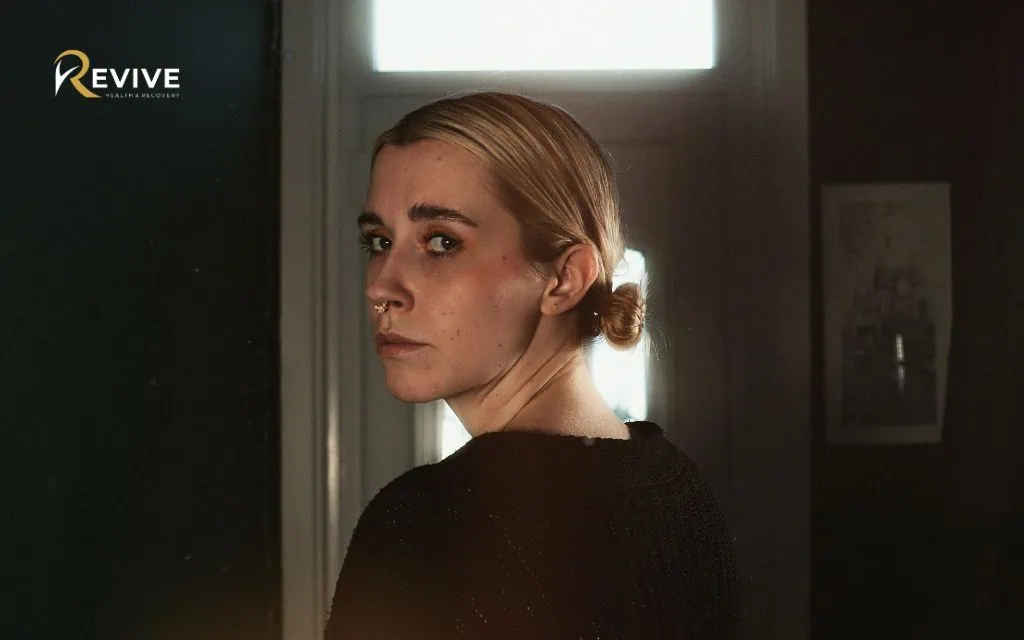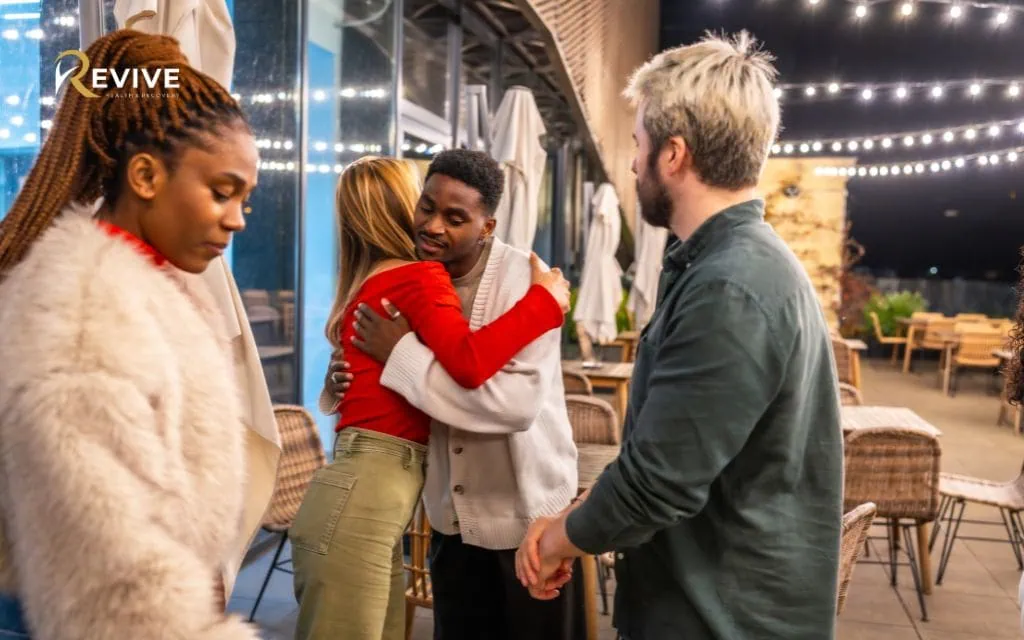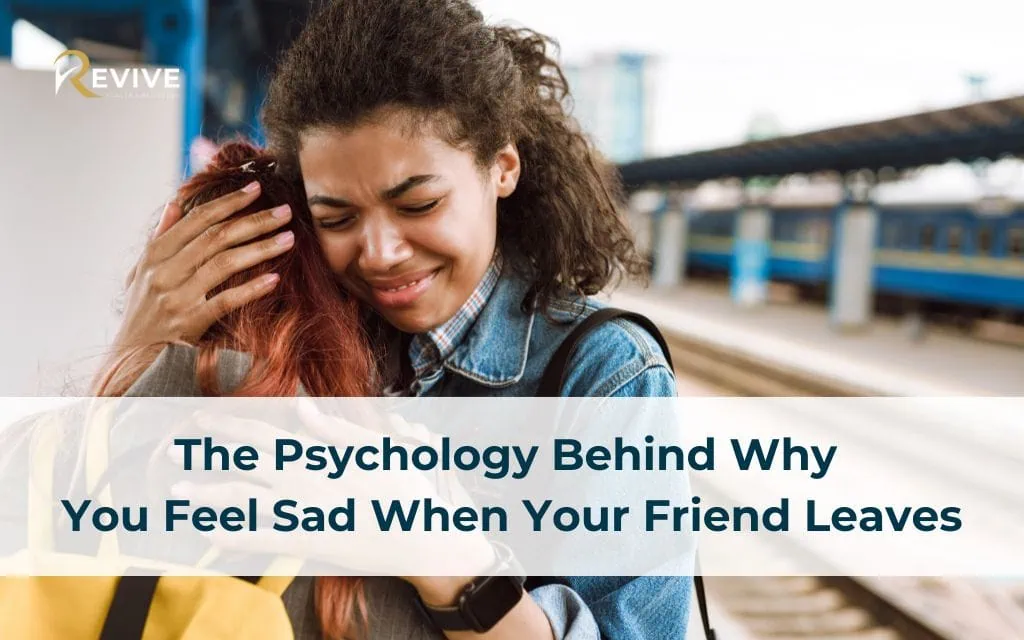Have you ever wondered “why do I feel sad when my friend leaves?” You’re not alone in experiencing this profound emotional response. Whether your best friend is moving across the country or you’re processing the end of a close friendship, the emotional pain you’re experiencing has deep psychological roots in attachment theory and social bonding.
Research by British psychiatrist John Bowlby demonstrates that humans form attachment bonds not just with romantic partners, but with close friends who provide emotional security and support. When these bonds are disrupted, our nervous system responds with genuine grief, similar to other significant losses. Understanding the science behind your feelings can validate your experience and guide you toward healthy healing. In Denver’s fast-paced, transient environment, friendship transitions are common, making mental health counseling especially valuable for processing these complex emotions.
The Psychology Behind Friendship Grief
Attachment Theory and Friendship Bonds
When you ask yourself “why does it hurt when my best friend moves away,” you’re actually touching on one of psychology’s most fundamental theories. John Bowlby, originally a researcher studying juvenile delinquency in the 1930s, made a revolutionary discovery that emotional bonds serve survival functions. His groundbreaking work bridged psychoanalysis with evolutionary biology, establishing that our need for connection isn’t just emotional, it’s biological.
Bowlby’s four-stage attachment development model, which remains a cornerstone of developmental psychology today, explains why friendship grief feels so intense. Your attachment style that developed in early childhood directly influences how you process friendship separation anxiety. If you have a secure attachment style, you might feel sad but maintain hope for future connection. However, those with anxious attachment often experience heightened separation distress, while individuals with avoidant attachment might delay their grief response entirely.

Struggling with intense emotions about a friend leaving? Our attachment therapy Denver specialists at Revive Health Recovery can help you understand your unique attachment patterns. Call us at (303) 268-4655 to explore how your attachment style affects your relationships.
Neurobiological Response to Friend Separation
The psychological reasons for sadness when friends leave extend beyond emotions into actual brain chemistry. When social bonds are severed, your brain experiences measurable changes in oxytocin and dopamine levels as the same chemicals involved in romantic attachment. This biological response explains why friendship grief can feel physically painful.
Your stress response system activates cortisol production during friendship loss, triggering the same neurological pathways as physical injury. This just your brain’s evolved response to threats to your social support network and can’t be seen as a weakness. Research shows that social pain and physical pain share overlapping neural circuits, which is why people often describe friendship loss as “heartbreak.”
Recognizing the Stages of Friendship Grief
Applying Kübler-Ross Model to Friendship Loss
Swiss-American psychiatrist Elisabeth Kübler-Ross, who originally studied terminally ill patients to understand the dying process, created what became universally known as the Five Stages of Grief. Her revolutionary work transformed how healthcare professionals approach death and bereavement, but her grief model (DABDA: Denial, Anger, Bargaining, Depression, Acceptance) applies to any significant loss experience, including friendship transitions.
Here’s how the grief stages friendship process typically unfolds:
Denial: “They’ll visit often” or “Nothing will change between us” Anger: Resentment toward your friend for leaving or circumstances forcing the separation Bargaining: Attempting to maintain closeness through constant texting, video calls, or making unrealistic plans Depression: Processing the reality of your changed relationship and feeling genuine sadness Acceptance: Finding peace with the new relationship dynamic while maintaining love for your friend
Timeline and Individual Variations
Why doesn’t grief follow a linear progression? Kübler-Ross was the first medical professional to systematically interview people about their loss experiences, and her research revealed that grief is highly individual. Cultural background, personality traits, and your specific attachment bonds all influence how you process friendship separation.
Some people cycle through stages multiple times, while others might skip certain stages entirely. This variation is completely normal and doesn’t indicate you’re “doing grief wrong.”
Need support navigating your unique grief process? Contact Revive Health Recovery for personalized grief therapy Denver Colorado services. Email us at contact@revivehealthrecovery.com to learn about our individualized treatment approaches.
Common Emotional Responses to Friends Moving Away
Anticipatory Grief Before Departure
Have you noticed feeling sad even before your friend actually leaves? This phenomenon, called anticipatory grief, is your mind’s way of emotionally preparing for loss. While this advance grieving can help cushion the eventual impact, it can also create complicated feelings of guilt about mourning a relationship that’s still present.
Many people struggle with supporting their departing friend while simultaneously processing their own emotional dependency and abandonment fears. This internal conflict is normal and reflects the complexity of human attachment bonds.
Post-Departure Adjustment Challenges
After your friend moves away, you might experience identity shifts as your social circle reorganizes. Questions like “Who am I without this friendship?” or fears about being replaced are common responses to relational loss. The loneliness that follows friendship transitions often reveals gaps in your social support systems, highlighting the importance of building multiple interpersonal relationships.
For those coping with best friend moving across country, these adjustment challenges can feel overwhelming. Your daily routines, inside jokes, and shared experiences suddenly have gaps that feel impossible to fill.

Healthy Coping Strategies for Friendship Transitions
Immediate Emotional Management Techniques
When sadness about friend leaving feels overwhelming, try these evidence-based emotional regulation techniques:
Mindfulness and grounding exercises help you stay present rather than catastrophizing about the future. Focus on five things you can see, four you can touch, three you can hear, two you can smell, and one you can taste.
Journaling for emotional processing allows you to externalize complex feelings. Write letters to your friend (that you don’t have to send) or document your daily emotions to track patterns.
Physical activity and endorphin regulation naturally combat depression and anxiety. Even a 10-minute walk can shift your neurochemistry and provide perspective.
Creative expression through art or music gives your emotions a healthy outlet while potentially creating meaningful gifts for your departing friend.
Maintaining Connection Across Distance
Modern technology offers unprecedented opportunities for maintaining friendship bonds across miles. However, successful long-distance friendships require intentional communication strategies and realistic expectations about frequency and depth of contact.
Consider creating new traditions that work across distances such as watching movies together online, playing video games, or having regular video coffee dates are good ideas. You always need to remember: the key is quality over quantity in your interactions.
Building New Social Support Networks
While honoring your existing friendship, it’s crucial to identify local community resources and develop new social connections. Denver offers numerous opportunities for building adult friendships through:
- Interest-based meetup groups
- Workplace social activities
- Neighborhood community centers
- Volunteer organizations focused on causes you care about
- Fitness classes or outdoor recreation groups
Ready to explore new social connections while processing friendship grief? Our mental health support friend leaving Colorado programs can help you balance honoring past relationships while building new ones. Call (303) 268-4655 to discuss your options.
When to Seek Professional Mental Health Support
Signs You May Need Therapy
While friendship grief is normal, certain signs indicate you might benefit from professional support. Consider therapy for friendship separation anxiety Denver if you experience:
- Prolonged depression or anxiety symptoms lasting more than six months
- Difficulty functioning in work, school, or family responsibilities
- Using substances to numb emotional pain
- Recurring relationship patterns that cause distress
- Persistent attachment or abandonment fears affecting multiple relationships
Types of Therapy for Friendship Grief
Professional friend moving away depression treatment takes many forms, depending on your specific needs:
Individual counseling for grief processing provides a safe space to explore your emotions without judgment. Your therapist can help you understand why do I feel sad when my friend leaves while developing healthy coping mechanisms.
Attachment-focused therapy approaches specifically address how your early bonding experiences influence current relationship patterns. This type of therapy for friendship separation anxiety Denver can transform how you form and maintain social connections.
Cognitive Behavioral Therapy (CBT) helps identify and change thought patterns that intensify grief. CBT is particularly effective for managing anxiety and depression related to friendship transitions.
Group therapy for shared experiences connects you with others navigating similar losses, reducing isolation and providing peer support.

Denver-Specific Resources and Support
Local Mental Health Services
Denver’s mental health landscape offers diverse options for friendship grief support. When seeking Denver mental health services, consider factors like insurance coverage, specialized training in attachment issues, and cultural competency. Many therapists in the area understand the unique challenges of Colorado’s mobile population and frequent friendship transitions.
Outpatient counseling and individual therapy sessions provide flexibility for working adults, while some programs offer evening or weekend appointments to accommodate busy schedules.
Colorado-Specific Considerations
Living in Colorado presents unique factors that can complicate friendship grief. The state’s high-mobility culture means friendship transitions are common, but this doesn’t make them less painful. Denver’s outdoor recreation opportunities can provide natural healing environments, while the state’s progressive mental health policies improve access to quality care.
Some residents also find that altitude affects their stress response and emotional regulation, making professional support particularly valuable during difficult life transitions.
Looking for Colorado therapy options that understand local challenges? Revive Health Recovery specializes in helping Denver residents navigate relationship transitions while building resilience for future connections.
Building Resilience for Future Friendship Transitions
Developing Secure Attachment Patterns
Understanding attachment theory explains friendship grief while providing a roadmap for healthier future relationships. Developing secure attachment patterns involves:
- Building self-awareness about your attachment style and triggers
- Learning communication skills for expressing needs and maintaining boundaries
- Practicing emotional regulation techniques during stress
- Cultivating multiple support systems rather than depending on single relationships
Creating Meaningful Connections in Denver
Denver offers numerous opportunities for building diverse social networks. Professional networking events can lead to adult friendships, while hobby-based groups provide natural common ground for connection. Volunteer opportunities not only serve your community but also connect you with like-minded individuals who share your values.
The key is approaching new relationships with openness while maintaining realistic expectations about timeline and depth of connection.
Ready to build stronger, more resilient relationships? Our healing center and recovery support programs help Denver residents develop secure attachment patterns and healthy relationship skills. Contact us at contact@revivehealthrecovery.com to learn more.
FAQs About Question “Why Do I Feel Sad When My Friend Leaves”
Is it normal to feel depressed when my best friend moves away?
Yes, feeling depressed when a close friend moves is completely normal and reflects the strength of your emotional bond. Research shows that friendship loss activates the same brain regions as physical pain. If symptoms persist beyond six months or interfere with daily functioning, Revive Health Recovery’s specialized grief therapy Denver Colorado can provide professional support.
How long does friendship grief typically last?
Friendship grief duration varies greatly depending on relationship closeness and individual attachment styles. Most people begin feeling better within 2-6 months, but adjustment periods lasting up to a year are normal. Revive Health Recovery offers personalized mental health counseling Denver to help you navigate your unique timeline.
Can friendship separation trigger anxiety or panic attacks?
Yes, friendship separation can trigger anxiety symptoms including panic attacks, especially for those with anxious attachment styles. This occurs because friendship loss activates threat detection systems. Our attachment therapy Denver specialists at Revive Health Recovery can help you understand and manage these responses effectively.
Should I try to maintain a long-distance friendship or let it fade naturally?
This depends on mutual desire and realistic expectations from both parties. Healthy long-distance friendships require intentional effort and clear communication. Revive Health Recovery’s therapists can help you navigate these decisions while honoring your emotional needs.
When should I consider therapy for friendship grief in Denver?
Consider therapy if grief interferes with daily functioning, lasts longer than 6 months without improvement, or reveals patterns affecting multiple relationships. Revive Health Recovery offers 24/7 support at (303) 268-4655 for residents throughout Colorado seeking professional friendship grief support.
Find Healing and Support at Revive Health Recovery
If friendship grief is impacting your daily life, professional support can help you process these complex emotions and build resilience for future relationships. Revive Health Recovery offers specialized mental health services designed to help Denver residents navigate life transitions and relationship challenges.
5 Reasons to Choose Revive Health Recovery:
1. Evidence-Based Therapy Approaches – Our licensed therapists use proven methods like Cognitive Behavioral Therapy (CBT) and attachment-focused therapy to address friendship grief and relationship concerns.
2. Personalized Treatment Plans – We understand that each person’s experience with friendship loss is unique, so we create individualized therapy plans tailored to your specific attachment style and needs.
3. Convenient Denver Location – Located at 1427 S Federal Blvd, we’re easily accessible for Denver residents seeking local mental health support without long commutes.
4. Flexible Outpatient Services – Our outpatient programs allow you to receive professional support while maintaining your work, school, and family commitments.
5. 24/7 Availability – Mental health support shouldn’t wait. Our team is available around the clock at (303) 268-4655 to provide crisis support and answer your questions about costs, insurance coverage, and treatment options.
Take the First Step Toward Healing
Friendship grief is a real and valid experience that deserves professional attention and care. Don’t navigate these complex emotions alone! Our compassionate team at Revive Health Recovery understands the unique challenges of relationship transitions and can provide the tools you need to heal and build stronger connections in the future.
Understanding why do I feel sad when my friend leaves is just the beginning of your healing journey. With proper support, you can transform friendship grief into opportunities for personal growth and deeper, more secure relationships.
Ready to begin your healing journey? Contact Revive Health Recovery today:
- Call us 24/7: (303) 268-4655
- Email: contact@revivehealthrecovery.com
- Visit us: 1427 S Federal Blvd, Denver, CO 80219
Remember, seeking help for emotional pain shows strength, not weakness. Let us help you transform friendship grief into opportunities for personal growth and deeper, more secure relationships throughout Colorado and beyond.



